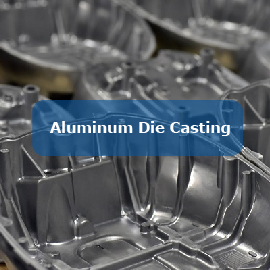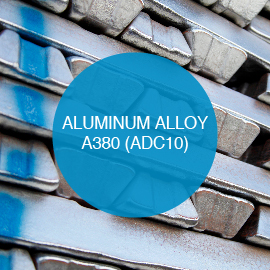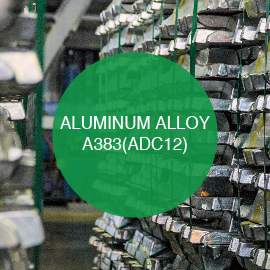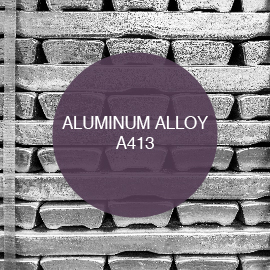ALUMINUM ALLOY A380 PROPERTIES
The A380 aluminum alloy is a copper-aluminum alloy primarily consisting of aluminum, silicon, and copper. The combination of thermal, mechanical, and casting properties is excellent in this alloy. The A380 aluminum alloy properities include amazing pressure tightness, fluidity, and hot cracking resistivity which makes it a really good alloy for die casting. Aluminum A380 has the following composition:
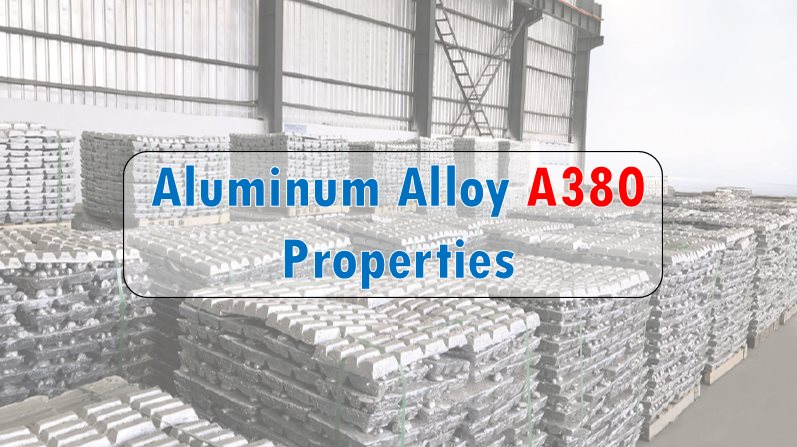
- Aluminum (Al) – Balanced
- Silicon (Si) – 7.5 to 9.5%
- Copper (Cu) – 3 to 4%
- Manganese (Mn) – 0.5%
- Magnesium (Mg) – 0.1%
- Zinc (Zn) – 3%
- Iron (Fe) – 1.3% (max)
- Nickel (Ni) – 0.5% (max)
- Tin (Sn) – 0.35% (max)
There are mainly two categories of properties for Aluminum A380 such as physical properties and mechanical properties.
Aluminum A380 Physical Properties
Physical properties are the properties that show different physical characteristics of a material or a component. A material has various physical properties such as melting point, density, thermal conductivity, friction coefficient, etc. The following table shows the physical aluminum A380 properties:
| Properties | Values |
| Density | 2.71 gm/cm3 |
| Melting Point | 566oC |
| Electric Conductivity | 23% IACS |
| Thermal Conductivity | 96 W/mK |
| Thermal Expansion Co-efficient | 21.8 μm/m K |
| Specific Heat | 962.9 J/kg K |
Aluminum A380 Mechanical Properties
Mechanical properties are the properties that show a material’s or a component’s reaction to applied load or force. Material or component has various mechanical properties such as impact strength, tensile strength, yield strength, fatigue strength, etc. The following table shows the mechanical aluminium A380 properties:
| Properties | Values |
| Tensile Strength (Ultimate) | 324 MPa |
| Impact Strength | 4 J |
| Yield Strength | 160 MPa |
| Elongation (in 50 mm) | 3.5% |
| Shear Strength | 190 MPa |
| Hardness | 80 Brinell |
Sunrise Metal – Top Aluminum Alloy Casting Manufacturer in China
When it comes to die casting manufacturers in China, Sunrise Metal is one of the top manufacturers because of our capability. From rapid prototyping and die casting tooling to CNC machining and surface finishing, we provide a complete one-stop service for aluminum alloy die casting.
Aluminum Alloys in Sunrise Metal
We most frequently work with the following aluminum alloys for manufacturing die casting components:
- Aluminum A380
- Aluminum A383 (ADC12)
- AlSi12, etc.
The A380 aluminium alloy has good fluidity for which it easily flows into the mold cavity when it is in liquid form. Its excellent pressure tightness helps to reach all the hard corners of the mold and reduce defects such as porosity. A380’s hot cracking resistivity is quite good which is beneficial in the heat treatment process.
When we manufacture components that require high corrosion resistivity and need to be lightweight, we use the Aluminium A383 instead of Aluminium A380. The AlSi9Cu alloy is a composite of aluminum, silicon, and copper whereas the AlSi10 alloy contains a lesser amount of copper.
Our Facilities, Experience, and Certifications
Sunrise Metal has 4 die casting facilities filled with advanced quality control and production equipment. Each facility is capable of operating separately which ensures our production efficiency and on-time delivery.
Our dedicated workers, engineers, and employees have more than 10 years of experience in this sector. We utilize each of their knowledge to have the best outcome in our production services. We provide our services worldwide.
Sunrise Metal’s excellent high-quality management system assures the quality of the products thoroughly to ensure that our clients get the best products. This is why we have several certifications such as ISO 13485, ISO 9001, and IATF 16949.
To get our services, please visit our contact page and use the contact number or email address to contact us.
What Are the Advantages of Aluminum A380 Alloy?
Due to special aluminum A380 properties, it offers various advantages. We have discussed the below:
Lighter Components
Aluminium A380 is suitable for manufacturing lightweight components with good strength. Aluminum itself is a light metal and copper and silicon increase its strength. So, the overall strength-to-weight ratio of A380 components is excellent.
More Surface Finishing Options
The A380 alloy has excellent machinability and so it is also good for different types of surface finishing. For example, anodizing shot blasting, powder coating, etc.
High Thermal Resistivity
Aluminum A380 has excellent hot cracking resistivity. For this reason, it is heat treatable, unlike most other metal alloys. Heat treatment improves the mechanical properties of the A380 parts.
High Corrosion Resistivity
The A380 alloy parts have amazing corrosion resistivity. The components do not get damaged due to corrosion easily and their lifespan increases for this reason.
Excellent Dimensional Stability
Aluminum A380 alloy exhibits excellent dimensional stability. This means when a part is made of this alloy, it doesn’t deform or the shape doesn’t change. This happens because the A380 alloy has very good pressure tightness.
Is A380 Aluminum Heat Treatment Possible?
Heat treatment is a process to alter (or improve) the properties of a material. There are different types of heat treatment processes such as tempering, quenching, aging, stress relieving, normalizing, and annealing.
The basic procedure involves heating or cooling a metal component to an extreme level to improve its properties. However, not all alloys are suitable for the heat treatment process. But the aluminum A380 alloy is heat treatable.
A380 aluminum heat treatment alters the mechanical properties of the alloy and improves the alloy. The A380 aluminum heat treatment process changes the microstructure of the component and reduces the residual stress. For this reason, the alloy becomes better for its applications.
What are the Differences Between Aluminum A380 and A6061 Alloy?
The differences between aluminum A380 and A6061 alloy are shown in the table below:
| Aluminum A380 | Aluminum A6061 |
| Contains less percentage of aluminum than A6061 | Contains more percentage of aluminum than A380 |
| The main composition contains more silicon and copper | The main composition contains less silicon and copper |
| Lower melting point than A6061 alloy | Higher melting point than A380 alloy |
| Thermal conductivity is not as good as A6061 | Better thermal conductivity than A380 |
| Aluminum A380 is not as strong as A6061 alloy | Aluminum A6061 is stronger than A380 alloy |
| A380 contains a small amount of nickel and tin in the composition | A6061 has no amount of nickel or tin in the composition |


